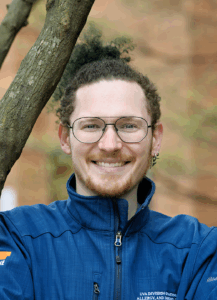
Paul Del was awarded a NIH F31 Ruth L. Kirschstein National Research Service Award from the National Institute of Allergy and Infectious Diseases which began on August 1, 2025. Paul is a doctoral candidate in the Division of Asthma, Allergy and Immunology in the lab of Judith Woodfolk.
Paul received his Bachelor of Science degree from George Mason University graduating from the Honors College in Chemistry and a concentration in Biochemistry.
We asked Paul to tell us about his research and hopes for the future.
Can you tell us about your research?
In the Woodfolk Lab, we study the immunological mechanisms underlying allergic diseases like atopic dermatitis, asthma, and eosinophilic esophagitis. My thesis research focuses on severe asthma and investigates how antiviral immune responses to common respiratory viruses—particularly rhinovirus (RV), the leading cause of viral exacerbations in allergic asthma—contribute to disease severity.
My work builds on previous findings from Dr. Lyndsey Muehling, who showed that higher numbers of RV-specific T cells are associated with reduced lung function in subjects with allergic asthma, and Dr. Jacob Eccles, who identified a subset of memory B cells expressing the transcription factor T-bet as key responders to new RV infections in healthy individuals. Before graduate school, I worked as a research fellow at the FDA in Dr. Mate Tolnay’s lab, where I studied Fc-like receptors, which are predominantly expressed in human atypical B cells. When I encountered Dr. Eccles’s work, I immediately recognized that the T-bet+ B cells he described aligned with the atypical B cell phenotype. My project evolved from a desire to apply my knowledge of atypical B cell biology to understanding how these cells—known to be pro-inflammatory in other disease contexts—interact with T cells and other immune cells to drive inflammation in asthma.
What drives or motivates your scientific pursuits?
I credit my scientific curiosity to my father, a theoretical physicist, who tried to teach my sister and me calculus when we were two years old. The calculus didn’t stick (I had to relearn it in high school), but a love for science and math took root and stayed with me. My passion for immunology, in particular, grew from my fascination with monoclonal antibodies as scientific tools. As I delved deeper into B cell biology and the complex interplay between immune cells required to develop and modulate antibody responses, I became captivated by how much remains unknown—especially in humans. The idea that the low-hanging fruit in this field has been picked, and what remains are the complex, nuanced questions that can’t be easily addressed, is what drives me most.
What are your future goals?
In the near term, I hope to finish my Ph.D. Beyond that, my path is less certain. A year ago, I would have confidently said I planned to return to the FDA to pursue immunology research and regulatory work. But given the current uncertainty facing biomedical research, I’m not sure where I’ll ultimately end up. What I do know is that I want to continue studying human immunology for as long as I can find a (paying) job that allows me to do so.
Congratulations on winning this award, Paul!
